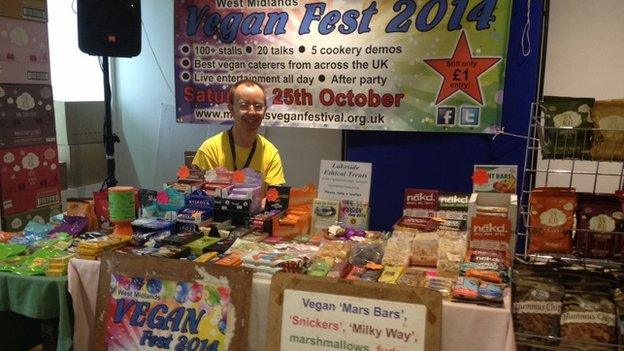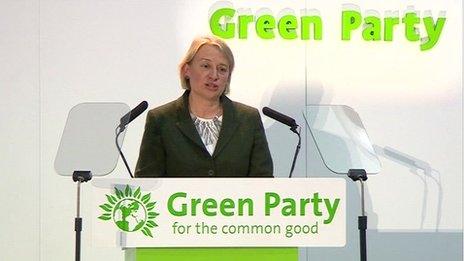Can the Greens' economic ideas grab the attention of voters?
- Published

Concerns about the planet and overhauling the economy are not mutually exclusive, Chris Mason learns
I'm standing in front of what I'm told is the "biggest mobile vegan sweet shop in the world".
Kevin White is in charge, with a garish banner emblazoned with "West Midlands Vegan Fest".
Mr White's colourful ensemble of products includes hummus chips and kale crisps.
It's a little insight into how Green conferences are different from the other political jamborees.
None of the banks or the supermarkets are here, with their suit-wearing smoothies smiling and charming.
The leader of the Green Party of England and Wales, Natalie Bennett, has put what she sees as a total shake up of the economy at the heart of her leadership.
It is a socialist pitch: higher income tax for the richest; a wealth tax for the very rich; renationalising the railways; a basic or citizens income for everyone, regardless of wealth; and a substantially higher minimum wage.
An estimate by the Citizens' Income Trust puts the cost or that idea at about £60bn a year.
That is more than half the annual cost of the NHS, so we are talking mega money.

But the Greens are proud not to indulge in what they would see as half measures or grubby compromises.
"We have a Labour Party which is barely distinguishable from a Tory-Lib Dem coalition," Ms Bennett told activists.
So, instead, their political tent is pitched well to the left of any other mainstream party.
Such is the focus on left-wing ideas. Aimed at a significant redistribution of wealth, you would be excused for wondering where the green stuff is at the Green conference.
Badgers and hedgehogs, fracking, flooding and climate change are all talked about, but the focus is elsewhere.
However, worrying about the planet and wanting a radically different economy are not mutually exclusive, the party's only member of the House of Lords told me.
Far from it, Lady Jones of Moulsecoomb insisted, each was needed to achieve the other.
So how are the Greens faring?
Well, just don't mention UKIP.
Sore point
If you think black and white are about as different as you can get, try Nigel Farage's outfit and the Greens for size.
There is very little about UKIP that doesn't wind up the Green Party.
But the media attention they can command and what the Greens perceive as the consequent lack of interest in them, is a particularly sore point.
"Our polling figures are about a third or half of UKIP's. I'd take a third of media coverage in an instant," Ms Bennett said.
Activists have cheered some opinion polls, suggesting support for the Greens has overtaken the Liberal Democrats.
But more recent polls suggest the Lib Dems are back in front.
The reality is neither are troubling the scorers.
And with the rise of UKIP, the political arena is increasingly crowded and noisy.
Green activists will hope their ideas are sufficiently novel and popular to attract attention and votes.
But it won't be easy.
- Published5 September 2014
